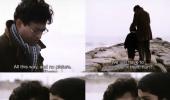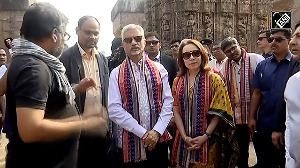'You will be remembered for a long, long, time,' notes Sudhir Bisht.

I met Irrfan Khan at the Press Club in New Delhi on February 21, 2012.
He had come there for a 'meet-the-press' session and was accompanied by Tigmanshu Dhulia, the director of the film Paan Singh Tomar.
The journalists were there in full strength and the atmosphere was lively.
There is a dialogue in the film in which the protagonist says something which roughly translates as 'There are no dacoits in the Chambal. All of them are in Parliament!'
During the Q&A session, a journalist friend asked Irrfan and Tigmanshu if the dialogue was appropriate.
The journalist said the storyline was set in the 1970s and Parliament was not so bad in that era.
Parliamentarians like Piloo Mody and Acharya J B Kripalani were in Parliament in the 1970s, my friend added, and that such a dialogue wasn't justified and it didn't befit a film-maker as eminent as Tigmanshu Dhulia.
Tigmanshu and Irrfan were quiet and looked uneasy. There was silence.

Then I stood up and said: "The 1970s was also when the Emergency was imposed and many leaders were thrown in jail for whimsical reasons. The 1970s was also that period in history when all fundamental rights were suspended. Film-making is a creative field and artists can take cinematic liberty without distorting basic facts."

After the press conference, I went to shake hands with Tigmanshu and Irrfan.
They shook hands warmly and Irrfan said, "Sir, aapne sambhal liya (You saved the situation). Thanks."
memories of that encounter come flashing to my mind as I learnt that Irrfan is no longer with us.
To me, he was a simple man and an outstanding actor.
He was loyal to his wife till the end as was his wife to him.
A rare quality in Bollywood, I say.
Farewell Irrfan, the most talented Khan of Indian cinema.
You will be remembered for a long, long, time.
Dr Sudhir Bisht, author and columnist, writes from Delhi. He can be contacted at sudhir_bisht@rediffmail.com












 © 2025 Rediff.com -
© 2025 Rediff.com -